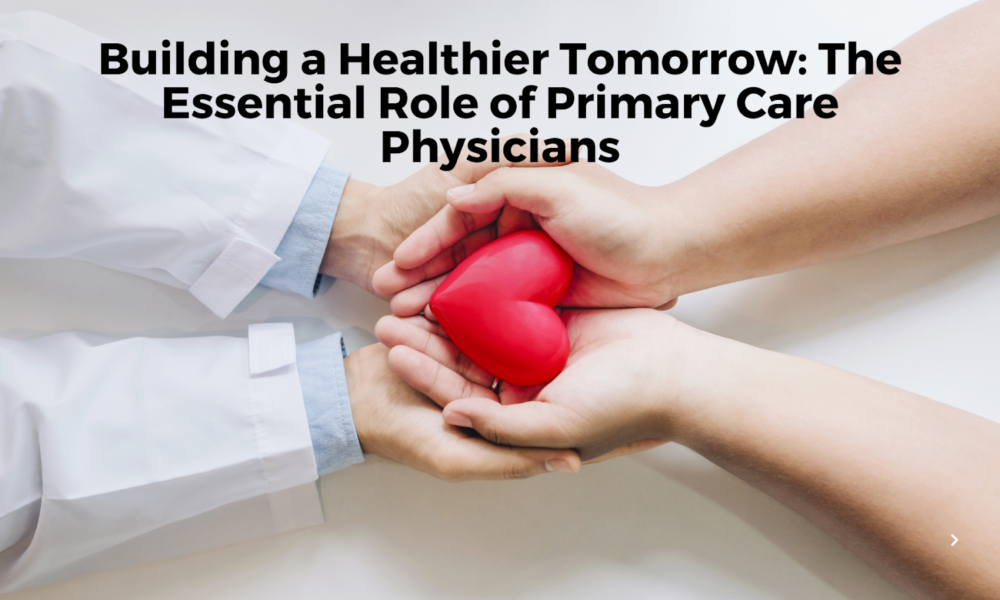Building a Healthier Tomorrow: The Essential Role of Primary Care Physicians
Did you know the key to a healthier future rests with your doctor? Primary care physicians are essential for our health because they are the first defense against illness. They do more than just treat sickness, they help patients stay healthy through prevention, build trust, and support overall well-being.
As we look at today’s healthcare challenges, it’s important to recognize these dedicated primary care physicians’ vital roles. We need more of them to ensure everyone gets quality care. Let’s explore how they are shaping a healthier tomorrow for all of us.
Who is a Primary Care Physician?
A primary care physician is your general practitioner whom you see to fulfill most of your health needs. They will help you with everyday health issues, check-ups, and maintenance of ongoing health conditions. PCPs will help keep you healthy and refer you to the right specialist when required. They work toward long-term relationships with their patients to further support their general well-being. Common types of PCPs are family doctors, internists, and pediatricians.
The Impact of Primary Care on Public Health
Most primary care medical practices focus on prevention, with a primary care physician responsible for catching most problems early. They can keep the community healthy through regular check-ups, screenings, and vaccinations. Regular screenings often improve outcomes for diseases like diabetes and certain cancers, and preventive vaccinations are vital to block infectious diseases.
Research has also been conducted to demonstrate the health status and hospitalization rates in areas with more primary care physicians. Such research determines that areas with more primary care physicians have low hospitalization rates and good health statuses.
Primary care is important because it is an entryway to the healthcare system, making access easier for underserved populations. Since 60 percent of American adults live with at least one chronic disease, managing prospective health needs through primary care is inevitable.
Primary Care Physicians as Health Advocates
Holistic Approach to Patient Care
One of the most valuable aspects of primary care is its holistic nature. Unlike specialists who focus on specific body systems or diseases, primary care physicians treat the entire body. This comprehensive approach allows them to:
- Integrate physical and mental health care
- Address social determinants of health
- Coordinate care across multiple specialties
By knowing a patient’s whole life and health, primary care physicians can better serve them by providing more effective and personalized care.
Building Trust and Patient Relationships
A primary care physician’s work can encourage good doctor-patient relationships. It forms the cornerstone of good delivery of care. Patients who maintain strong relationships with their doctors are:
- More likely to follow treatment plans
- More comfortable discussing sensitive health issues
- More capable of making informed decisions about their health
Improving these relationships benefits the patient as an individual and at the same time contributes to the overall health of a community.
Innovations in Primary Care Delivery
The development of primary care is changing quickly with technology, especially through the influence of telemedicine. Some crucial features about it are as follows:
- Improved Access: Telemedicine helps patients who might live far away or suffer from mobility issues and can easily have medical care.
- Reduced Wait Times: Patient appointments get scheduled quicker and it automatically reduces the wait time.
- Better Monitoring: Doctors can monitor chronic conditions through regular virtual check-ins.
Though telemedicine is not a replacement for in-person visits, it ensures timely interventions when required.
Primary care has taken a new collaborative care approach where doctors, nurses, and other professionals such as social workers work together. This teamwork delivers better patient care and ensures increased demand for primary care services.
Challenges Facing Primary Care Today
Workforce Shortages
The most significant challenge in primary care is the growing shortage of physicians. According to new projections from the Association of American Medical Colleges (AAMC), the United States could face a physician shortage of as many as 86,000 by 2036. The problem is even more serious in rural areas and underserved urban communities.
Factors contributing to the shortage:
- Aging of the physician workforce
- Growing patient demand, especially among an aging population
- Fewer students in medical school choose primary care specialties
The lack of such physicians will have to be addressed on multiple fronts:
- Incentives for medical students to enter careers as primary care physicians
- Expansion of the nurse practitioner and physician assistant professions
- Innovative care delivery models to maximize efficiency
Financial Constraints
Financial stress sometimes challenges the capability of primary care physicians to do good care. They make relatively lower incomes than specialists. This makes it difficult to sustain their practices. The amount of paperwork they have to handle can lead to burnout, and the cost of new technology can be hard to manage. New payment models such as value-based care are possibilities for solving these problems.
How to Build a Healthier Tomorrow?
By doing regular check-ups and advocating for primary care with proper diet and exercises that keep you active, you’re building a healthier tomorrow for yourself and others in your community.
The Future of Primary Care
Emphasizing Value-Based Care
The future of primary care is based on a shift from volume-based to value-based care, focusing on:
- Better patient outcomes
- A better patient experience
- Lower healthcare costs
By aligning financial incentives with quality care and patient satisfaction, the new models will transform primary care delivery.
Continuous Education and Training
As healthcare continues to evolve, so too must the skills and knowledge of primary care physicians. Continuous learning is indispensable for:
- Staying updated with medical advancements
- Adapting to new care delivery models
- Addressing the increasing needs of diverse patient populations
Investment in the continuous professional development of primary care physicians will be the key to building a healthier tomorrow.
Conclusion
Primary care physicians are important to a healthier future—working on prevention, holistic care, and close relationships with patients. We now reach a moment when support and strengthening of primary care become possible to ensure care is accessible to all who need it. Take control of your health today, and schedule an appointment with your primary care physician. Investing in primary care is investing in your long-term well-being. The path to a healthier tomorrow begins with you!
FAQs
- What specific roles do primary care physicians play in preventive health?
Primary care physicians enable the detection of early risk factors, regular screenings, and the provision of immunizations all of which dramatically reduce the onset of chronic diseases.
- How does the patient-doctor relationship influence health outcomes?
Health outcomes are augmented by a healthy trusting relationship that fosters improved communication, adherence to treatment plans, and approach.
- What are the best ways to find a good primary care doctor?
Ask family members and friends for referrals. You can get some names of doctors who are certified online and can care for your health needs. Make an appointment to come in and see whether you feel comfortable with them and their practice style.







